#iphigeneia at aulis
Explore tagged Tumblr posts
Text
Agamemnon: And what do the signs say now? What do your gods say? What’s the gossip from Delphi, and it better be good. The wind, he whines. What about the wind? It’s here, he drawls. The wind, I say, the wind was here yesterday, the wind is here today and the wind’ll be here tomorrow but my daughter will never be here again. Sing that on your fuckin’ altar.
Girl on an Altar, Marina Carr
#i love this play so much#girl on an altar#marina carr#house of atreus#the oresteia#oresteia#iphigenia at aulis#iphigeneia at aulis#iphigenia#agamemnon#words#tagamemnon#greek myth retellings
27 notes
·
View notes
Note
Wait did Odysseus really get like insulted as sisyphus' bastard son is like he related to that guy who tried tricking death twice
Yes it appears so. In many plays like Sophocles or Eurypedes, characters who dislike him or wish to offend him seem to be calling him "Son of Sisyphus" and het the chorus always chants him as "Son of Laertes" which I find it interesting so it seems to me more like a rumor or an insult for him rather than his real heritage.
As I answred to another amazing ask by @autumn0689 in the past here It is a very interesting subject. So forgive me for the length!
For starters Odysseus is being insulted as a bastard, an illegitimate son. As I answered to the amazing ask by @leynaeithnea about illegitimate children here being illegitimate was a source of shame on its own. I mean even nowadays to call someone "You bastard!" is an insult. Back then it ran even deeper because being an insult of one's heritage (since they believed nobility runs in blood especially the Athenian writers that imposed this). Odysseus is technically a king to mention that as a king he is not legitimate son is like saying he has no right to his position; that he is not even supposed to be there; that he is not worth of it. They also indirectly insult his family as well; Laertes has no legitimate son, his wife was disloyal to him and had a child with another man and Laertes chose to take that child as his own. Calling Odysseus "bastard of Sisyphus" is basically an insult to his entire famiy (thus me making Odysseus go mad at Philoctetes in my random story here
And as I answered to the previous ask it all melts down to who is Sisyphus; a sinner, someone who cheated on the gods twice, someone that as you said cheated on death himself and now he is being punished eternally. Sisyphus was in a way used as the embodiment of human arrogance, shame and example for punishment. They basically call Odysseus the bastard son of the most sinful man. That was to insult him by the way Odysseus too often uses indirect methods to achieve his goals. They basically say "the apple fell under the apple tree". Odysseus cannot be the spawn of a possible Argonaut. He must be the child of a sinful person given how he is not the ideal warrior for his time. Indirectly or not they were saying that Odysseus was the embodiment of trickery, of human arrogance and of someone that will mock even the gods to achieve his goals (ironically that is not the case at least with Homeric hero as we know he was one of the most pious to the gods among his peers -praised by Zeus himself- despite him being known for his great hubris to Poseidon) Another thing him being accused as son of Sisyphus does is to diminish his godly line. Anticlea, his mother, is the grandaughter of Hermes in many sources. Once again Odysseus cannot be possibly sharing his bloodline with the gods! He must be the spawn of something sinful! Thus again the insult.
So far the worst mention of it I have heard was in "Philoctetes", where Philoctetes is so furious at Odysseus that not only does he say he is the illegitimate son of Sisyphus but he takes it a step further and insinuates that Sisyphus sold Odysseus to Laertes. So not only does he call Odysseus the illegitimate spawn of a sinner and a result of adultery but he also says that Odysseus is not worth more than the average slave, given how Laertes buys him from his father for money. But again what intrigues me is that the choir around still calls him "Son of Laertes". Even when Menelaus calls him "son of Sisyphus" in "Iphigeneia en Aulis" the choir still calls him "Son of Laeretes". So it seems more like a rumor or an insult among his peers rather than an actual irrefutable fact.
Hahaha I have come to the conclusion that at this point "Son of Sisyphus" means "son of a bitch" really! XD
For Odysseus himself being called basically a "cockroach that refuses to die" might as well be almost like a compliment and in many cases he has spoken as if he doesn't care for other people hating him (for example in Philoctetes he mentions how he can be literally anything the situation calls for) but I have to be honest by the ideals of his time I do not think he would like it. That would imply not only that his blood is impure but also that he is not equal to the others, that he is not worth to be at their presence and let's face it no one likes the prostect of their own family being dragged to the mud. Odysseus himself doesn't seem always affected by talk on the surface (in Philoctetes he even gives permission to Neoptolemous to do so in order to persuade Philoctetes to trust him) but judging by his reactions quite often when insulted, he explodes. So he is not entirely immune to insults. In fact it was one of these insults that made him explode his anger to Polyphemus and comit his blasphemy to Poseidon (and yes I have written something on that too! Hehehe)
Sorry if this was too long! I hope it helps!
#katerinaaqu answers#greek mythology#odysseus#tagamemnon#the odyssey#odyssey#homeric poems#philoctetes#sophocles philoctetes#eurypedes iphigeneia en aulis#iphigeneia en aulis#sisyphus#sisyphos#odysseus and sisyphus#heroes of the trojan war#anticlea#laertes#laertes and anticlea#anctclea and sisyphus
100 notes
·
View notes
Text
“She comes to meet death, To stain the altar of the goddess, To hold her girl-throat Toward the knife-thrust.”
― Euripides, from 'Iphigeneia in Aulis' (translated by H.D.)
#quote#H.D.#Hilda Doolittle#Euripides#Iphigeneia in Aulis#poetry#Collected Poems 1912 - 1944#tell all the truth but tell it slant#current reading#current reading quotes#not out of void but out of chaos#Iphigeneia
54 notes
·
View notes
Text
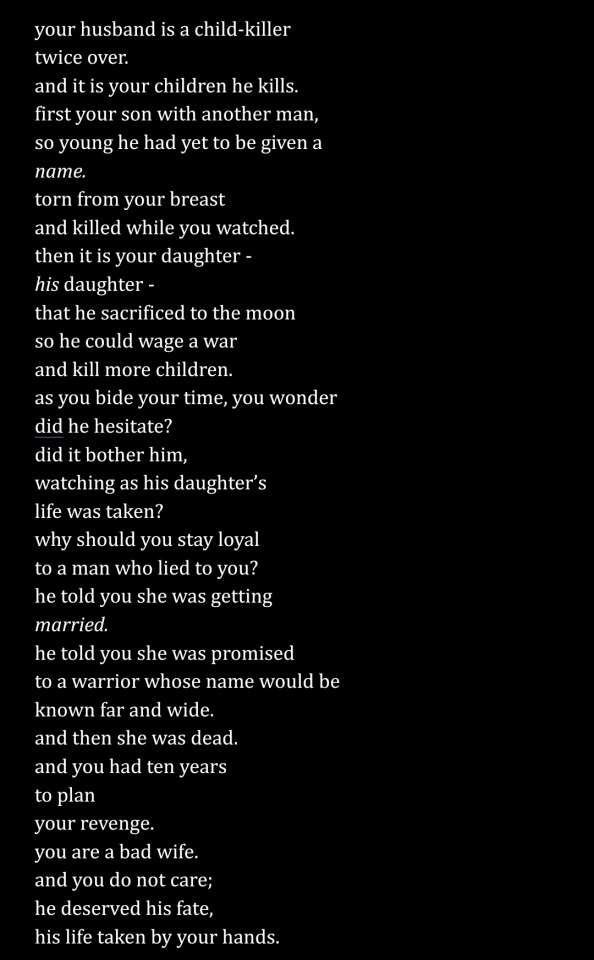
klytaimnḗstrā in mykē̂nai
#tee writes poetry#clytemnestra#child death tw#agamemnon#iphigeneia#murder tw#greek mythology#the oresteia#iphigenia in aulis
30 notes
·
View notes
Text
Feeling the intense desire to go read Greek epics and Classic plays and also modern retellings again… accidentally hit me in a one-two-three knockout of things I love:
The Bronze Age Mediterranean, my third-favorite archaeological place/time;
Greek mythology as a whole, risen from the deep from when I would push myself through gym class in middle school by telling myself I was practicing and getting in shape for the day I would be chosen to be one of Artemis’s huntresses;
The concept of language, translation, and adaptation
#Putting ‘Iphigeneia in Aulis’ and ‘Wrath Goddess Sing’ on request at the library like what#Asking my mom to bring me my never-actually-finished copy of Emily Wilson’s Odyssey translation#Sorry for party classicsposting
21 notes
·
View notes
Text
at the freud museum talk when robert icke was like oh yes i love shakespearean crowds my favourite is the one during brutus’ funeral speech i was like 🧠➿🧠. also i think he successfully condensed the threat of the greek army in iphigeneia at aulis and the people of thebes in oedipus jnto arguments between menelaus and agamemnon and then oedipus and creon which is like. it literally works he has written his way around the need for a chorus. and also substituted individual vs the collective for conflict between brothers. because of [gunshot]
21 notes
·
View notes
Text
greek tragedy (mostly familicide bc that's my thesis) as textposts again bc i can't stop myself




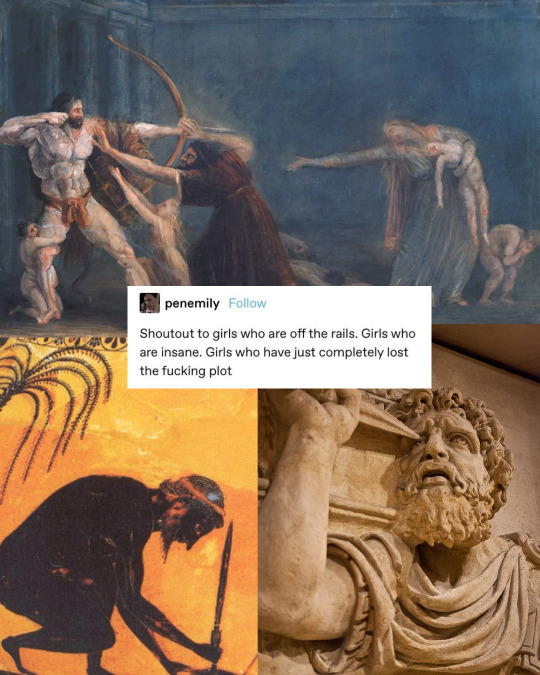

(pt1)
Kreusa and Ion - Ion // Orestes - Oresteia
Alkestis - Alkestis // Iphigeneia - Iphigeneia in Aulis
Herakles/Ajax/Oedipus - Herakles/Ajax/Oedipus Tyrannus // Klytaimnestra - Agamemnon
#tagamemnon#ion#oresteia#alcestis#iphigenia#heracles#ajax#oedipus#clytemnestra#agamemnon#sophocles#euripides#aeschylus
68 notes
·
View notes
Text

Iphigeneia haunts the ruins of Troy — 25.05.2023
[Iphigenia in Aulis, tr. Charles R. Walker; The Fall of Troy, Daniel van Heil; Dresden's ruins in WWII]
210 notes
·
View notes
Text
Sketches of Times Lost
Day 28: Deleterious
eons ago, a different conversation at the end of a different world. venat & azem. major endwalker spoilers. final days headcanons. written for ffxivwrite2024. 1409 words ao3 link

Dusk falls upon on a ruined world.
Iphigeneia sits in the Hall of the Convocation amidst a sea of shattered glass. The shards scatter across broken and bloodied tile bloodied tile, no rhyme or reason to their pattern, glinting bloodred in the light of the descending sun. She could have taken her seat—it is one of the few still standing—and yet she found herself drawn to the centre. She stood here once, before she claimed her seat, judged before the fourteen persons chosen to guide their people, and thus their star. She recalls how her predecessor sat upon that very throne that day, white hair pulled back, the glyph of Azem upon her face, blue eyes glowing keenly from beneath her mask. The proud smile that graced her lips when she was judged worthy of the seat.
An eon ago, or close enough to it.
The sky beyond the broken windows bleed red. Vibrant, with orange and purple lines streaking through it. It would be stunning, if not for the dark god growing on the horizon, hanging in the heavens like a falling star trapped in the planet’s atmosphere. Held in place, gorging on the souls that sustain it. Once He was little more than a purple spot in the sky, as distant as a star. But now He grows day by day, until some day He will blot out the sun.
Their saviour. Their end.
Zodiark’s power is vast, His aether unparalleled. A primal capable of rewriting the laws of the star, halting the catastrophe the way a dam blocks a river. A terrible solution for a terrible catastrophe, a solution reached after months of debate here at the top of their lofty tower even as the city below shook and wailed and screamed and died. And yet she cannot help but wonder what now stirs within it, what horror they have unleashed. Umbral can still, umbral can stop, but umbral will grow.
How many more will they lose to feed a devouring god?
Oh, Hades. Little brother. What have you done?
She has not seen him since before the Summoning, when the terror of fear was made manifest and Amaurot ran red with blood. Even the outskirts were not safe; every city, every town, every village across the entire star was cannibalizing itself. And yet it was her choice to turn her back on them. She could not bring herself to vote between sacrificing her people and watching them murder each other in the street. Not when she was so close to finding the answer—the true answer—entangled at the centre of it.
A secret within a secret within a secret.
The brightest minds of the Convocation—experts in their field, all—swore stagnating aether currents were the root of the cause. She did not agree. The conclusion did not make sense. To lose control of creation to such an extent could not be the work of rotten aether, unless they have been misguided in the fundamentals of aether for thousands of years.
She brought her concerns to Lahabrea, thinking her lover—the cleverest of them all, to his own detriment—would at least hear her out, and found them dismissed.
She brought them to Emet-Selch, and again they were dismissed.
Finally, she brought them to Elidibus, pleading for him to intercede. He did not agree.
And so she left.
The Defector she is now. Traitor. The one who turned her back on them at the darkest hour, refusing the role they wished her to play.
Iphigeneia exhales a breath and raises her head, her pale golden hair falling about her shoulders as she regards the sky. This will be her final day in Amaurot. Soon, she will be free of the Capitol for good. Return to Aulis, where her daughter waits. Where her work continues.
This is the last step.
“Iphigeneia.” A familiar voice washes over her—clear, crisp, strong. Though where once she would have found it reassuring, now she finds it… wrong. “I have come as you asked.”
Iphigeneia pauses, back straight, frozen in her spot. Glass crunches beneath Venat’s steps as her erstwhile mentor approaches and she sits beside her, legs folded beneath, her unbound white hair tumbling about her shoulders, stained red by the light. Though she hates to say it, her mentor has changed in the passing years, even before the catastrophe struck. The event in Elpis, the one shrouded in much mystery, changed her as much as it changed Hades. “You say that as if you intend to parlay,” she says, ignoring the hollow discomfort in her gut. “But we are not opposed, as far as I know.”
“You left the Convocation.”
“I would not take part in any of it.”
“You speak with such venom.” Venat raises her head, regarding the seat of Azem. “But the Convocation simply seeks to secure the future of our star.”
“This is not a future I had any desire to see.”
Silence. The wind howls beyond the broken windows, whistling through shattered stone and glass.
“The offer still stands,” Venat says. “I would gladly have you at my side in the days to come.”
“And my answer is still no,” Iphigeneia replies.
“An answer I will not speak ill of. Your reasons are your own.”
“You say that, and yet in the same breath you pry, oh mentor dearest.” She pauses, her expression growing grim. As the sun descends, the seat of Azem grows tall in the dark, casting a long shadow across them both. “I am not one of your followers, easily swayed by clever speeches and pretty words. I am not that judicial officer from the Bureau of the Architect, hanging onto your every word, idolizing us both without a unique thought in her head. You forget I know you as well as I know myself. This is no simple mission to rebalance the star, countering Darkness with Light. That is the front. What lies behind?”
“None. Zodiark grows unrestrained, but his power is not eternal. Not without more sacrifice. A permanent solution must be found. That is the truth of it.”
“All of the truth?”
Venat regards her, her gaze sorrowful, yet firm. She glances away, looking to the seat of Lahabrea. Charred and blackened and turned to ash, its glyph glowing like embers. “That is all I am at liberty to say.”
The discomfort returns, worse than before. They once shared everything—why can she not share this? “Who decides the liberty, Venat?” she asks coldly. “You? For what reason are you sworn to secrecy, or will you still not tell me what happened that day in Elpis?”
Venat pauses, her gaze passing now to Elidibus’ seat. The chair is split in twain, its glyph stained and smashed and scratched into oblivion. Not that he has much use for it now. Not when he sits at the heart of Zodiark. “I cannot say.”
Cannot say, cannot say… Is there anything she is willing to say? Iphigeneia has been chasing the vestiges of this secret for more years than she can count. A familiar attributed to her, a woman with the colour of her soul. A disruption in Elpis. Memories lost. Kairos run amuck… The pieces are there, but they are jumbled together so nonsensically that she cannot yet see the full picture. But she knows enough now to point at a horrifying truth, one that drove her to invite her mentor here.
She has told no one of what she suspects. Not even the few who remain she trusts, which is very few indeed. For the truth is both wild and unbelievable as it is horrifying and damning. If she is right, it would break their hearts as surely as it has hers. There is no power as unsettling as that of time.
At last, Iphigeneia rises to her feet, her footsteps echoing hollowly on the broken tile beneath. She stands before Venat, her piercing golden orange eyes gazing down upon her, the seat of Azem towering behind. “Then tell me this, mentor mine,” she says at last. “Did you know? Did you know what our future held?”
Venat does not answer. She simply looks ahead, regarding the seat of Emet-Selch, one of the few that has escaped the disaster unscathed.
The sound of her silence speaks more than words.
Iphigeneia’s jaw clenches. She strides from the chamber without further word and does not look back.
#ffxiv#ff14#final fantasy xiv#ffxiv fanfic#ffxiv fanfiction#ffxivwrite#ffxivwrite2024#writing tag#myreiawrites2024#venat#azem#endwalker#endwalker spoilers
11 notes
·
View notes
Note
Not counting Patrochilles:
1) Who are your favorite characters from Greek mythology (in general)? 2) Who are your favorite Homer characters specifically?
Omg what a great question. So I have many many favourites when it comes to Greek myths, it's hard to choose. I basically grew up reading simplified versions of these myths, specifically these children's books by Sofia Zarampouka (a greek author and painter, I'm sure any Greeks following me will recognise these lol):
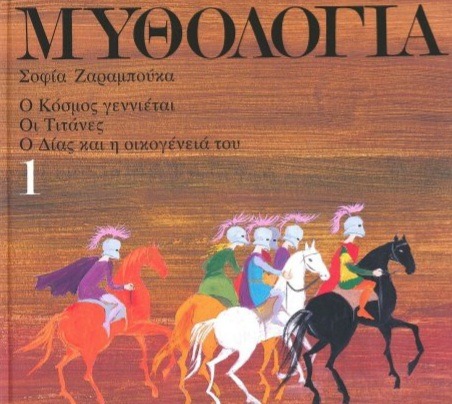
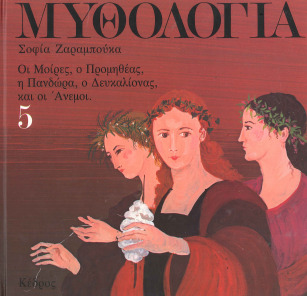
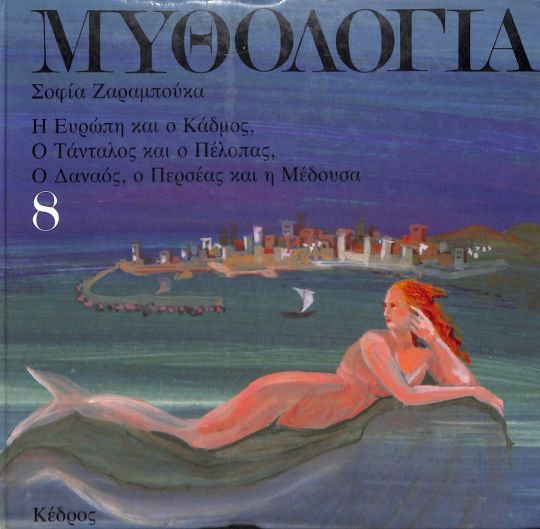
Just look at all those gorgeous covers. I had the whole series at some point and I have no idea where it is now, but I used to read these over and over when I was younger.
I absolutely loved reading about the labours of Heracles, those were really fun even though I didn't love Heracles himself as a character. I also really liked Theseus' story (Ariadne and her yarn! The maze! The Minotaur! Poor Aegeus dying at the end aksjs so sad) even though, again, I never much liked Theseus as a character haha. Atalanta was one of my favourites and her myth is very cool, and I also liked Perseus' story a lot. Antigone is a huge favourite, as well as Iphigeneia. I find their stories very compelling and very tragic and I think about them a lot!!!!
Another one that I absolutely love is Medea and her story with Jason and the Argonauts. The Argonauts on their own have a very interesting myth (heroes that sail to a strange land with strange customs in search of the mythical golden fleece) but the appearance of Medea and her later story with Jason is what makes it a fascinating story for me. She is the embodiment of what most Greeks at the time would find at once incredibly alluring and incredibly threatening: she is foreign (the Other), beautiful, powerful, she has hidden knowledge and magic, she defies her own father and kills her brother to help Jason escape. And when Jason, dickhead that he is, abandons her to marry someone else, she commits the ultimate taboo of killing her own children. She is such a polarising and blood-chilling character and I really love seeing how much she has inspired artists through the centuries.
As for Homeric characters, I do love Hector a lot, and the moments when he appears in the Iliad are among my favourites, alongside all the Patrochilles moments. I find Nestor very entertaining and he's always a delight when he appears, and I also enjoy Diomedes' and Odysseus' bro chemistry a lot lol. Clytemnestra is also one of my favourite characters in Greek myth in general. Technically it's Euripides' version of her that I love, based on his Iphigeneia at Aulis play, she doesn't appear in the Homeric works but she is mentioned so it counts lol. I also really love Briseis-- even though she talks very little in the Iliad, I still love her characterisation and the overall role and significance she has in the story. Another one I really love is Priam, I cannot read the passages where he appears in the Iliad without tearing up, he's just such a kind and noble person and his interactions with other characters in the epic give so much depth and nuance to Trojan society and culture and the tragedy that befell them.
Most of my fave Homeric characters are from the Iliad, but I should give special mention to some Odyssey characters I really love. I always found Circe very intriguing and the descriptions of her island and her magic etc are SO interesting and I wish we had been given more!! (Honestly even though I adore the Iliad I always found the Odyssey much more fun to read lol). Telemachus and Peisistratus are also special blorbos (and here I should give a shoutout to the amazing @figsandphiltatos for writing the fic that made me insane for them alsjs 😭🙏)
Gosh this is already so long and I feel like I could talk about this forever ahaha. I probably left a lot of characters and myths out but didn't want to ramble too much. Thank you once again for this question!
10 notes
·
View notes
Text
Clytemnestra: I crawl into bed, my ghost child beside me. I dread the nights because she comes to torture me with her eyes of muck and the blood spilling from the gash to her throat as if it was cut a second ago. And her fury, you’d think it would split the walls as she howls out the injustice, that I am still here and will not come to her though she has begged me, that she will wait no longer, that she will come to me. And I believe none of these things and still they happen.
Girl on an Altar, Marina Carr
#girl on an altar#marina carr#iphigeneia at aulis#iphigenia at aulis#iphigenia#iphigeneia#the oresteia#oresteia#clytemnestra#klytemnestra#klytaimnestra#words#tagamemnon#greek myth retellings#house of atreus
27 notes
·
View notes
Note
Can you tell us your opinions on Epic the Musical?
Sure thing!
I do really like most of the songs, they're all such bops! Kudos to Jorge for real, he's definitely talented in the music department, and so passionate about his project. Also appreciate how the poor guy has stated that his work should not be treated as a substitute for the Odyssey and other legitimate sources.
I firmly believe that when you're retelling a myth, you should take creative liberties. You should add your own, original touch, because otherwise what's the point? I'll just go read Homer. I especially like that the gods are more involved because I'll be real, the biggest reason I'm into mythology is the gods. But there are some bits I disagree with, or straight up dislike.
Odysseus' characterization is my biggest problem. "I still believe in goodness, I still believe that we could be kind," "mercy is a skill more of this world could learn to use" he would not fucking say that. Fear of Odysseus turning the Achaean army against him is one reason Agamemnon eventually relents to sacrificing Iphigeneia in Iphigeneia in Aulis; Odysseus chooses to kill Astyanax all by himself, without the intervention of any god. You often see those two extremes in retellings: the characters are either overly sanitized to be made more palatable, or are villainized to an absurd degree. Both at the expense of complex, multi-faceted personalities and motives we see in the original epics, plays etc.
Which ties directly to my next gripe: some of the decisions made about the plot. Zeus forces Odysseus to choose between Astyanax or his family. Why? Later on, he once again makes him choose between himself or his crew. This one was especially eye roll-worthy to me because in the Odyssey, he just straight up kills Odysseus' men and that's all. They slaughtered Helios' cattle, they should be the ones punished. What's the point of having Odysseus choose other than angst?
My other, much smaller issue is that the lyrics are just....so clunky sometimes lol. The Underworld saga suffers the most from this. "How am I to reunite with my estranged?" "When a god comes down and makes a fleet drown, is he scared that he's doing something wrong? Or does he keep us in check so we must respect him and now no one dares to piss him off?" what are thoooooose 😭
But I was so, so pissed at the plot of the Thunder saga, I'd just quit EPIC altogether if the songs weren't so catchy and Jorge so charming.
2 notes
·
View notes
Text
hello! it’s been a while! i definitely did not forget that i’d made this tumblr account!!!
over on instagram i like to post a little monthly roundup of what i’ve been reading and what i thought about what i’ve been reading (i’m testing out a thing this month where i read 1 greek/roman mythology retelling + an original greek/roman text it was inspired by and it’s v fun!!) so here’s a roundup of what i’ve read this quarter: (quarter. QUARTER. how has it been a quarter of the year already HELP)
JANUARY

how to pronounce knife (souvankham thammavongsa) ⭐️⭐️⭐️⭐️ anita and me (meera syal) ⭐️⭐️⭐️⭐️⭐️ iphigeneia at aulis (euripides; trans. eckhardt & harrison) ⭐️⭐️⭐️⭐️ elektra (jennifer saint) ⭐️⭐️⭐️ a court of thorns and roses (sarah j maas) ⭐️⭐️⭐️ a court of mist and fury (sarah j maas) ⭐️⭐️⭐️ a court of wings and ruin (sarah j maas) ⭐️⭐️ a court of frost and starlight (sarah j maas) ⭐️⭐️
FEBRUARY

james and the giant peach (roald dahl) ⭐️⭐️⭐️ animal farm (george orwell) ⭐️⭐️⭐️⭐️ daughters of sparta (claire heywood) ⭐️⭐️⭐️⭐️ agamemnon (aeschylus; trans. de may) ⭐️⭐️⭐️⭐️⭐️ pride and prejudice (jane austen) ⭐️⭐️⭐️⭐️ helen (euripides; trans. michie & leach) ⭐️⭐️⭐️⭐️ a court of silver flames (sarah j maas) ⭐️ make more noise! (various) ⭐️⭐️⭐️ the bone witch (rin chupeco) ⭐️⭐️⭐️⭐️
MARCH

the heart forger (rin chupeco) ⭐️⭐️⭐️⭐️ norma jean baker of troy (anne carson) ⭐️⭐️⭐️⭐️⭐️ the odyssey (homer; trans. wilson) ⭐️⭐️⭐️⭐️⭐️ ithaca (claire north) ⭐️⭐️⭐️⭐️⭐️
13 notes
·
View notes
Text

This just in, Iphigenia is a fucking badass
#my art#fanart#Iphigenia#Iphigeneia at Aulis#yes the play spells her name different! that’s transliteration for you#anyway I LOVE HER
23 notes
·
View notes
Text
asked Agamemnon to sacrifice his oldest daughter and he actually did it the absolute madman XDXDXD
#ancient greek suggestions#artemis#golden stag#agamemnon#iphigeneia#trojan war#achilles#aulis#greek fleet#sacrifice#the absolute madman#queue
1K notes
·
View notes
Note
i'm making a letterboxd list of movies with girardian (especially violence and the sacred) vibes. do you have any suggestions
sorry but i do not watch enough films to suggest anything that isn’t just. here is a film i have watched and inevitably thought was girardian due to my brainrot. BUT also isn’t it wild how master and commander: the far side of the world diverges from the plot of the novel to…… insert essentially the plot of iphigeneia at aulis? into the middle of the film. like they did not have to do that. And Yet. + any film about guys on a boat is girardcore tbh. i do not have good taste in films also. you should watch hornblower (1998-2003) though. there’s duels in it + hashtag can’t stage a trial without a stage
#SO sorry anon i watch like 1 film a year and otherwise just rewatch Boat Media forever. ravenous (girardian) counts as boat media#did you know the mimesis bingo card was based off a) violence and the sacred and b) things that happen in the hornblower films. real.#beeps
11 notes
·
View notes